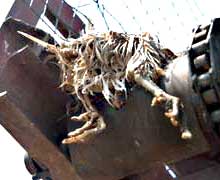
This dead chicken on the end of a conveyor belt has come to symbolize the history of abuses run up by MoArk, LLC at their Neosho facility. Newton County resident Mark Adams has submitted a document to an administrative hearing commission which suggests that the company's history be taken under consideration in ruling on whether it should be allowed to expand.
A citizen interested in preserving a legacy for future generations and as chief spokesperson for citizens opposed to the unregulated expansion of MoArk, LLC, Mark Adams has submitted a document to an administrative hearing commission which counters the Neosho egg-producer's strike and dismiss motion of a prior citizens' appeal. Adams' remarks were copied to Robert J. Brundage, MoArk's legal counsel in Jefferson City and to Assistant Attorney General Harold D. Bozoian, legal counsel for the Missouri Department of Natural Resources.
Adams cites several arguments favoring dismissing the permit issued by the MDNR for MoArk expansion in exchange for issuing a permit allowing only MoArk's current livestock population and on-site buildings. Disagreeing with the MDNR's contenion that company history is irrelevant in a permitting decision, he is calling for "a full, open and proper review of past MoArk LLC corporate/personal history, both past and present, before issuing a permit to expand operations at same site."
The appeal by Adams states:
Histories of violations such as parking tickets, inhumane animal treatment, consumer fraud, drunk driving, convictions of misdemeanors and felonies, just to name a few, are part of everyone’s record and follow that person when many licenses or permits are being considered for that person. Given the current legal personhood status of corporations, 1st ( Santa Clara County v. Southern Pacific Railroad Company [118 U.S. 394 (1886), and the Moark corporation’s desire for “due process” 2nd there should be the same inclusion and consideration of a corporation’s history, including business ethics, when moving forward with issuing any permit to continue operation in the State of MO.
The attempt by MoArk's lawyers to throw out the need for language in the permit requiring an air monitoring or odor research station based on the grounds that the Clean Water Commission does not have subject matter jurisdiction over odor compliance was attacked by Adams who called statements by MoArk officials regarding this issue "conflicting."
"After reissuing the permit and after a Missouri Air Conservation Commission approved air/odor station is fully functional, a period of 12 consecutive months of satisfactory air/odor monitoring should be enforced before any MDNR expansion permits are issued for this Moark 7 Farms location" is Adams' request.
MoArk's contention that evaluating the economic impacts of the proposed expansion does not pertain to water quality was met with the opposite argument by Adams who stated that water quality does affect economics "everywhere water quality is compromised." He contends that the MDNR's resolution in moving the manure generated by MoArk's operation out of the impaired Elk River watershed north to the unimpaired Spring River watershed is "not a viable long term sustainable solution" that has the "great potential" of having future negative economic impact.
Adams questions the sudden reversal by the MDNR in alleging that the technology used by the Roggen facility in Colorado and not that of Freemont Farms in Iowa should be the benchmark for comparison with MoArk's Neosho facility. Climactic factors as well as permeability of the soil suggested that Freemont Farms was a more apt facility for comparison, Adams points out, at the same time calling attention to a subsequent visit by several interested Neosho citizens that revealed severe odor and fly problems with the Iowa facility.
Other discrepancies pointed out by Adams deal with MoArk's water usage claims and their subsequent well drilling, and the proclamation by the MDNR that it is a "science-based" organization yet their discounting of data that portend a severe water shortage in the aquifer surrounding the MoArk facility.
Adams says he doesn't know how Administrative Hearing Commissioner June Striegel Doughty will rule on the points he submitted. However, he hopes that she will fairly weigh all the evidence submitted by all sides in the matter and, if appropriate, schedule a hearing to allow further evidence to be presented.






Comments